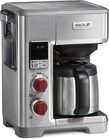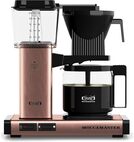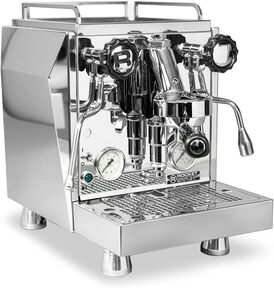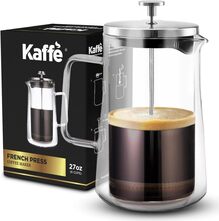Coming soon: Free Products from Kaffè !!!
Please share our site so we can do more giveaways
Best Espresso by Price: Gaggia
|
Best Epresso Machine!
|
|
Zojirushi: Best Coffee/Espresso Mugs
|
To brew the absolute best cup of coffee, buy your beans from a local roaster and if possible, buy them on the day they were roasted. Avoid the big coffee chains and 'store coffee'. Get yourself a very good grinder; Burr Grinders are best. Many people feel the French Press (also called a Coffee Press) makes the best coffee; you just have to experiment (an innovative french press is the Aeropress). Finding fresh beans, the right grind, the best brewer, and the brew time that works for you is how you create the very best cup of coffee. You can also find some excellent beans online.
Gourmet Espresso: Find a Local RoasterThe real secret to a great cup of coffee is finding locally, fresh-roasted beans. This is where it all starts, and is the #1 thing you can do. You will find that the better the cup of coffee, the less you need sugar and creamers - which also makes your coffee healthier! Click here to find a local roaster.
Help The Environment, and Farmers tooWe make our planet better with good choices about sustainability, ethics, and recycling. To support ethical coffee organizations, search online for phrases like Fair Trade Coffees, Shade Grown Coffees, and Direct Trade Coffee. One of our favorites is Equal Exchange.
|
Types of Coffee
There are two main types of coffee, Arabica nd Robusta. Arabica is the better tasting coffee; Robusta is used in the lowest quality, 'store' brands. The best beans are those that are fresh roasted; the best coffee then comes from grainding and brewing immediately. This is because coffee has many different kinds of oils, and some of them are called 'volatile' - which means they do not lasts long - They age and/or evaporate. So brew as soon as you can after grinding, and enjoy your cup of coffee! Some of the more modern espresso machines include a grinder, so the whole process is automated.
Medical Study: Coffee Reduces Liver Cancer
Medical Study: Coffee Hydrates well
Medical Study: Coffee May Reduce Diabetes
Medical Study: Coffee Improves Memory
Medical Study: Coffee May Help Vision
Medical Study: Coffee Industry Less Sustainable Than Ever
Medical Study: Coffee Hydrates well
Medical Study: Coffee May Reduce Diabetes
Medical Study: Coffee Improves Memory
Medical Study: Coffee May Help Vision
Medical Study: Coffee Industry Less Sustainable Than Ever
Brief history of Coffee
Coffee is a brewed drink made from roasted coffee beans, which are the seeds of the Coffea plant. The Coffea plant is native to tropical regions of Africa, and coffee has been consumed for centuries, with a history dating back to the 15th century.
Coffee is one of the most widely consumed beverages in the world, with an estimated 2.25 billion cups of coffee consumed every day. It is typically consumed hot or cold and can be prepared in a variety of ways, including drip brewing, espresso, French press, and Turkish coffee. In addition to its popularity as a beverage, coffee has been studied for its potential health benefits. These benefits include improved cognitive function, increased energy and alertness, and a lower risk of certain health conditions such as type 2 diabetes and Parkinson's disease.
The coffee industry is a major global economic force, with millions of people employed in coffee production, processing, and distribution. However, the coffee industry also faces challenges, including environmental concerns related to deforestation and the use of pesticides, as well as economic issues related to fair trade and the price of coffee.
Overall, coffee is a complex and fascinating topic, with a rich history and cultural significance around the world.
Coffee has a rich history that spans centuries and continents. It originated in Ethiopia and quickly spread throughout the Arab world, where it became a staple of Islamic culture. From there, it made its way to Europe and eventually the Americas, where it has become a beloved beverage enjoyed by millions. Here are five major coffee innovations that have shaped the history of coffee:
Coffee is one of the most widely consumed beverages in the world, with an estimated 2.25 billion cups of coffee consumed every day. It is typically consumed hot or cold and can be prepared in a variety of ways, including drip brewing, espresso, French press, and Turkish coffee. In addition to its popularity as a beverage, coffee has been studied for its potential health benefits. These benefits include improved cognitive function, increased energy and alertness, and a lower risk of certain health conditions such as type 2 diabetes and Parkinson's disease.
The coffee industry is a major global economic force, with millions of people employed in coffee production, processing, and distribution. However, the coffee industry also faces challenges, including environmental concerns related to deforestation and the use of pesticides, as well as economic issues related to fair trade and the price of coffee.
Overall, coffee is a complex and fascinating topic, with a rich history and cultural significance around the world.
Coffee has a rich history that spans centuries and continents. It originated in Ethiopia and quickly spread throughout the Arab world, where it became a staple of Islamic culture. From there, it made its way to Europe and eventually the Americas, where it has become a beloved beverage enjoyed by millions. Here are five major coffee innovations that have shaped the history of coffee:
- Roasting: While coffee was first brewed in Ethiopia, it wasn't until the Arab world that the beans were roasted before being brewed. Roasting the beans not only added flavor and aroma to the coffee, but it also helped to preserve the beans and make them easier to transport. The practice of roasting coffee beans quickly spread throughout the Arab world, and by the 16th century, it had become a common practice.
- Instant Coffee: In the late 19th century, a Belgian man named George Washington invented instant coffee. This innovation involved dehydrating brewed coffee to create a powder that could be easily rehydrated with water. Instant coffee was a huge success, especially in the United States, where it became a popular drink during World War II.
- Espresso: Espresso is a strong, concentrated coffee beverage that is made by forcing hot water through finely ground coffee beans. The first espresso machine was invented in 1901 by an Italian inventor named Luigi Bezzera. The invention of the espresso machine revolutionized the coffee industry and gave rise to a new culture of coffee drinking in Italy.
- Fair Trade: Fair trade coffee is a movement that seeks to ensure that coffee growers receive fair prices for their beans. This movement began in the 1960s and 70s, when many coffee growers in South America were struggling to make a living wage. Today, fair trade coffee is widely available and has helped to improve the lives of countless coffee growers around the world.
- Single-Serve Coffee: Single-serve coffee is a relatively recent innovation that has become extremely popular in the United States. This technology involves using a machine that brews a single cup of coffee at a time, using pre-packaged coffee pods. The first single-serve coffee machine was introduced in the 1990s, and since then, the market for single-serve coffee has exploded, with numerous companies producing their own machines and pods.
Brewing the Best Cup
Brewing the very best cup of gourmet coffee requires attention to detail and careful preparation. Start by selecting high-quality, freshly roasted beans and grind them just before brewing. Use a burr grinder to ensure an even grind, and choose the appropriate grind size for your brewing method. Next, use clean, filtered water and heat it to the ideal temperature of 195°F to 205°F. Avoid using boiling water, which can scorch the beans and result in a bitter taste. Depending on your preferred brewing method, you may need to use a specific technique for brewing, such as pour-over, French press, or espresso. Follow the instructions carefully and use the appropriate amount of coffee and water for your brewing device. Finally, pay attention to the brewing time and ensure that the coffee is brewed for the correct amount of time to achieve the desired strength and flavor. With careful attention to detail and a focus on quality ingredients, you can brew a cup of gourmet coffee that is sure to impress even the most discerning coffee connoisseur.










